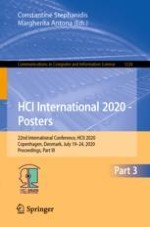2020 | OriginalPaper | Chapter
Me Without My Smartphone? Never! Predictors of Willingness for Smartphone Separation and Nomophobia
Authors : Ricardo Muench, Catharina Muench
Published in: HCI International 2020 - Posters
Publisher: Springer International Publishing
Activate our intelligent search to find suitable subject content or patents.
Select sections of text to find matching patents with Artificial Intelligence. powered by
Select sections of text to find additional relevant content using AI-assisted search. powered by
